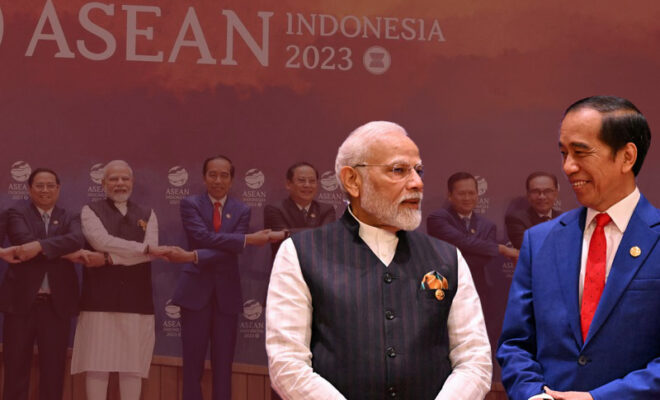PM Modi’s Visit To Jakarta For ASEAN-India Summit Concludes

Prime Minister Narendra Modi’s brief yet fruitful visit to Jakarta for the ASEAN-India and East Asia Summits has concluded.
During his visit, PM Modi stressed the importance of amplifying the voice of the Global South, including in the G20, which was welcomed by ASEAN leaders.
Modi discussed various areas of cooperation, including connectivity, maritime collaboration, digital transformation, trade, environment, health, and traditional medicine.
PM Modi proposed a twelve-point plan covering these areas. Notably, he announced the establishment of the ASEAN India Fund for Digital Future to enhance financial connections and expressed support for ERIA, an ASEAN think tank for deeper ASEAN-India relations. He also emphasized a free, open, and rules-based Indo-Pacific and ASEAN centrality.
Prime Minister Narendra Modi, during the ASEAN-India summit, emphasized India’s strong support for ASEAN centrality, highlighting that ASEAN is a central pillar of India’s ‘Act East’ policy and plays a crucial role in India’s Indo-Pacific strategy.
This statement is significant as it comes amid concerns about China’s assertiveness in the South China Sea, where some ASEAN members have territorial claims conflicting with China’s.
PM Modi stressed the importance of an Indo-Pacific where international law applies to all countries equally.
He also highlighted the shared values and history connecting India and ASEAN and called for a rules-based international order to address global challenges.
During the ASEAN-India summit, Prime Minister Narendra Modi announced that India will establish an embassy in Timor-Leste.
This decision highlights India’s commitment to ASEAN and its relations with Timor-Leste, a nation that recently joined ASEAN as an Observer before becoming a full member.
ASEAN is a significant regional grouping, and India, along with other countries like the US, China, Japan, and Australia, engages in dialogues with it.
This move is expected to enhance India’s diplomatic presence and strengthen its ties with Timor-Leste and ASEAN member nations, receiving a positive response from both Timor-Leste and ASEAN.
Also Read:- Air Canada Kicks Off Women As They Don’t Sit On Vomit Covered Seats
India is also planning to invite the leaders of the Quad group—President Biden, Australian Prime Minister Albanese, and Japanese Prime Minister Kishida—as guests for its Republic Day celebrations.
This invitation is significant and symbolic, showcasing India’s diplomatic strategy. It’s being explored as all three Quad leaders will be in India for the G20 Summit, with India set to host the Quad Leaders’ Summit next year.
If successful, this move will send a strong signal to China, emphasizing the unity of these countries in response to China’s actions in the Indo-Pacific region. The final decision will be based on the leaders’ availability.



